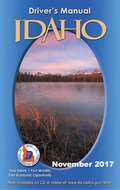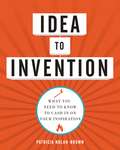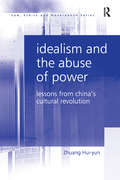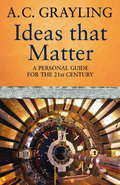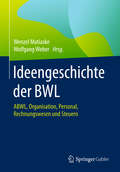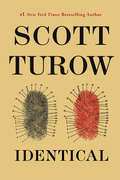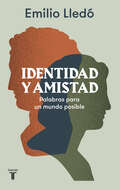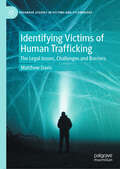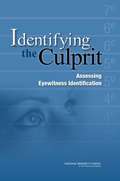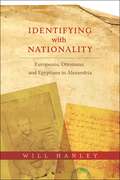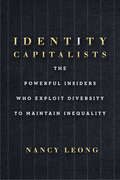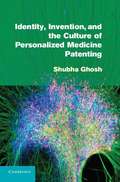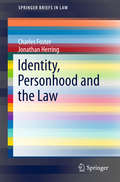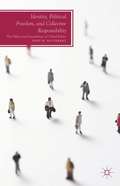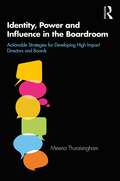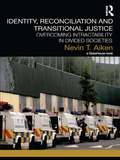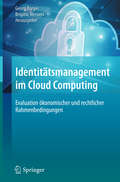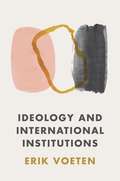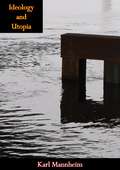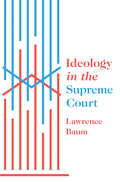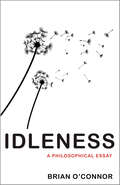- Table View
- List View
Idaho Driver's Manual (November #2017)
by The Idaho Transportation Department Division of Motor VehiclesThis handbook paraphrases the language of the Idaho Motor Vehicle Code. DMV handbooks are designed as road rules and regulations guides for new drivers and new Idaho residents. The driving manuals can help you learn the skills and laws you need to be a safe driver and help you prepare for your driving tests.
Idea to Invention: What You Need to Know to Cash In on Your Inspiration
by Patricia Nolan-BrownYou don't have to be a mechanical genius to be an inventor. Anyone can invent--a parent wrestling with a baby sling . . . a coach frustrated with slick-soled running shoes . . . an office worker determined to keep the computer cords untangled. Inventing is simply finding clever solutions to everyday challenges. Author and inventor Patricia Nolan-Brown has turned common annoyances into ingenious and money-making products. She shares the tricks of her trade in Idea to Invention, a practical guide that helps ordinary people look at their world with the eyes of an inventor. Readers will learn six simple steps to invention--and discover: * How they rate on six crucial personality traits * Creativity habits that spark invention * The power of tape-and-paper prototypes to refine their vision * How to navigate the ins and outs of licensing and patenting their product * The pros and cons of finding a licensed manufacturer vs. running a home-based assembly line * How to promote their invention--from perfecting the pitch and finding store buyers to trade-show shortcuts and strategies for creating buzz online * Product enhancements that add years to shelf life From initial concept to thriving business, this handy guide simplifies the invention process and gives creative thinkers the competitive edge they need to achieve success.
Idealism and the Abuse of Power: Lessons from China's Cultural Revolution (Law, Ethics and Governance)
by Zhuang Hui-yunThis book analyses the abuse of idealism with particular reference to China's Cultural Revolution. The work examines abuse at two levels: the state leaders' metaphysical vision as the interpretation of idealism at the top with state power; and the psychological state of the masses at the bottom of society. The concept of abuse itself is discussed with the author arguing that idealism is often used to justify abuse while many are all too willing to accept this as idealism itself. On the other hand, many dismiss the idealist vision because of the horrible consequences of the abuse. For these reasons, the book holds that abuse of idealism should not be confused with the original intent of idealism. It is further argued that the masses often complement dictatorship due to a basic weakness of human nature. Finally, the book proposes that the concepts of human dignity and equal access to truth are prerequisites for the effective rule of law within China.
Ideas That Matter: A Personal Guide for the 21st Century
by A.C. GraylingLeading philosopher's guide to the ideas that will shape the 21st century'Ideas are the cogs that drive history, and understanding them is half way to being aboard that powerful juggernaut rather than under its wheels'. This is a book that celebrates the power of ideas: thought can, and does, change the world. And, in turn, ideas evolve. Fundamentalism, environmentalism and bioethics are defining our future just as Marxism, feminism or existentialism have influenced our present. So what do we need to know as we move into the 21st century? More than a simple reference work, this is A.C. Grayling's personal and heartfelt guide to the ideas, past and present, that shape our world. Covering religion, philosophy, scientific theory and political movements, each alphabetically ordered entry illuminates, elucidates and provokes. Written with Grayling's customary fire and erudition, the result is a book that aims both to arm readers with knowledge and engage them in philosophical debate.
Ideas That Matter: A Personal Guide for the 21st Century
by Prof A.C. GraylingLeading philosopher's guide to the ideas that will shape the 21st century'Ideas are the cogs that drive history, and understanding them is half way to being aboard that powerful juggernaut rather than under its wheels'. This is a book that celebrates the power of ideas: thought can, and does, change the world. And, in turn, ideas evolve. Fundamentalism, environmentalism and bioethics are defining our future just as Marxism, feminism or existentialism have influenced our present. So what do we need to know as we move into the 21st century? More than a simple reference work, this is A.C. Grayling's personal and heartfelt guide to the ideas, past and present, that shape our world. Covering religion, philosophy, scientific theory and political movements, each alphabetically ordered entry illuminates, elucidates and provokes. Written with Grayling's customary fire and erudition, the result is a book that aims both to arm readers with knowledge and engage them in philosophical debate.
Ideas Triumphant: Strategies for Social Change and Progress
by Lawrence LaderThe intellectual spark that set off the flames of revolution in France and the United States was the same one that prompted a change in the way women viewed themselves and their role in society. Initially, the struggle for equal rights was meant to apply only to men but the strength of an ideal took hold and a movement was born. "Ideas Triumphant" is the history of the reproductive rights movement from its early roots in post-revolutionary France to the enormous strides made by reproductive rights activists in the twentieth century. As women began to take control of their reproductive choices they were able to make greater contributions to the world of finance, academics, and sciences. No longer beaten down and burdened with countless pregnancies and the accompanying high risk of death during childbirth, these women were able to contribute more to society and slowly dispel the myth of female inferiority. "Ideas Triumphant" follows a path of an enlightened thought from its revolutionary beginning to its current place in its continuing evolution. It looks at the important people and the events that lead to the success of an idea and the transformation of a culture.
Ideengeschichte der BWL: ABWL, Organisation, Personal, Rechnungswesen und Steuern
by Wolfgang Weber Wenzel MatiaskeDieses Buch erläutert und entwickelt das Profil der Betriebswirtschaftslehre weiter und liefert wichtige Beiträge zur Ideengeschichte der Betriebswirtschaftslehre. Das Buch konzentriert sich dabei insbesondere auf die Gebiete Organisation, Personal, Rechnungswesen, Steuern und Allgemeine Betriebswirtschaftslehre. Gegenwärtig zeichnet sich die Möglichkeit ab, dass sich die fachlichen Teilgebiete der Betriebswirtschaftslehre verselbständigen. Dazu trägt auch, aber nicht nur, das mittlerweile weltweit dominierende angelsächsische Verständnis des Faches bei, das durch eine weitgehende Zersplitterung der betriebswirtschaftlichen Teilgebiete gekennzeichnet werden kann. In der deutschsprachigen Betriebswirtschaftslehre besteht deshalb seit einigen Jahren das wieder entfachte Interesse und Bemühen, wichtige Beiträge zu der Ideengeschichte der Betriebswirtschaftslehre und den Wurzeln des Faches in das wissenschaftliche Bewusstsein zu rücken. Dieses Buch leistet dazu einen wichtigen Beitrag. Die Autoren identifizieren und diskutieren markante Ideen und Beiträge zur Entwicklung des Faches. Neben dem Blick zurück wird auch der aktuelle Zustand des Faches betrachtet. Auf dieser Grundlage werden denkbare weitere Entwicklungslinien von den Autoren abgeleitet.
Identical
by Scott TurowState Senator Paul Giannis is a candidate for Mayor of Kindle County. His identical twin brother Cass is newly released from prison, 25 years after pleading guilty to the murder of his girlfriend, Dita Kronon. When Evon Miller, an ex-FBI agent who is the head of security for the Kronon family business, and private investigator Tim Brodie begin a re-investigation of Dita's death, a complex web of murder, sex, and betrayal-as only Scott Turow could weave-dramatically unfolds...
Identidad y amistad: Palabras para un mundo posible
by Emilio LledóPREMIO PRINCESA DE ASTURIAS DE COMUNICACIÓN Y HUMANIDADES 2015 PREMIO NACIONAL DE LAS LETRAS ESPAÑOLAS 2014 Un acontecimiento muy esperado: el ensayo al que Lledó se ha dedicado durante los últimos diez años. «En la otra ladera del dolor y la desesperación se dibuja el horizonte sorprendente de la amistad». En uno de los momentos más emocionantes de la Ilíada, Príamo reclama a Aquiles el cadáver de su hijo Héctor. En el tenso diálogo entre ambos, surge un destello de humanidad y Aquiles rinde honores al héroe muerto ofreciendo hospitalidad al anciano padre. A pesar de la guerra, nos dice Emilio Lledó, Homero nos deja atisbar el horizonte de la amistad, «que acoge y sublima el dolor de la muerte». La libertad de las personas guarda una estrecha relación con la libertad de las palabras, pues implica posibilidad de pensar, posibilidad de ser. En este maravilloso ensayo, Lledó juega y conversa con los numerosos términos que la cultura griega nos ha legado, y se detiene en el de amistad, un concepto clave a la hora de explorar quiénes somos. Lo contrapone a otra noción esencial, la de identidad, hoy tan manida y viciada, que, en su origen, lejos de aludir a lo que nos diferencia, se refería a nuestra mirada humana sobre el mundo y sobre nosotros mismos, y es un componente fundamental de la democracia. Lledó rastrea ambos conceptos en las fuentes clásicas, trazando maravillosas conexiones entre ellos -así como con el resto de grandes palabras- y profundizando en sus sucesivas interpretaciones. Al hacerlo, ofrece una lúcida visión de la vida moderna. La crítica ha dicho:«Si hubiera muchos intelectuales como Lledó el nuestro sería un país bien distinto.»Elvira Lindo
Identifying Victims of Human Trafficking: The Legal Issues, Challenges and Barriers (Palgrave Studies in Victims and Victimology)
by Matthew DavisThis book emphasises the importance of difficulties identifying victims of human trafficking. It is often challenging for trafficked victims to be identified, for victims to self-identify, and for victims to be distinguishable from other groups of vulnerable people such as economic migrants, asylum seekers, refugees and smuggled persons. This book examines the environments where difficulties of identifying foreign victims exist or identification is overlooked entirely. It argues that a victim-centred approach is required to recognize them for who they are, a trafficked victim. This lies in opposition to the justice system which often takes the oath of prosecuting victims rather than identifying them as victims, criminalising them for offences as part of their exploitation, forced upon them under duress from their exploiters. Drawing on a range of subjects, this book contributes to existing academic work and speaks to anti-trafficking organisations, charities, public authorities and staff within the UK’s National Referral Mechanism to play a pivotal role in spotting, referring and identifying more foreign trafficked victims, despite the current negativity surrounding immigration.
Identifying the Culprit: Assessing Eyewitness Identification
by Committee on Scientific Approaches to Understanding Maximizing The Validity Reliability of Eyewitness Identification in Law Enforcement the CourtsEyewitnesses play an important role in criminal cases when they can identify culprits. Estimates suggest that tens of thousands of eyewitnesses make identifications in criminal investigations each year. Research on factors that affect the accuracy of eyewitness identification procedures has given us an increasingly clear picture of how identifications are made, and more importantly, an improved understanding of the principled limits on vision and memory that can lead to failure of identification. Factors such as viewing conditions, duress, elevated emotions, and biases influence the visual perception experience. Perceptual experiences are stored by a system of memory that is highly malleable and continuously evolving, neither retaining nor divulging content in an informational vacuum. As such, the fidelity of our memories to actual events may be compromised by many factors at all stages of processing, from encoding to storage and retrieval. Unknown to the individual, memories are forgotten, reconstructed, updated, and distorted. Complicating the process further, policies governing law enforcement procedures for conducting and recording identifications are not standard, and policies and practices to address the issue of misidentification vary widely. These limitations can produce mistaken identifications with significant consequences. What can we do to make certain that eyewitness identification convicts the guilty and exonerates the innocent? "Identifying the Culprit" makes the case that better data collection and research on eyewitness identification, new law enforcement training protocols, standardized procedures for administering line-ups, and improvements in the handling of eyewitness identification in court can increase the chances that accurate identifications are made. This report explains the science that has emerged during the past 30 years on eyewitness identifications and identifies best practices in eyewitness procedures for the law enforcement community and in the presentation of eyewitness evidence in the courtroom. In order to continue the advancement of eyewitness identification research, the report recommends a focused research agenda. "Identifying the Culprit" will be an essential resource to assist the law enforcement and legal communities as they seek to understand the value and the limitations of eyewitness identification and make improvements to procedures.
Identifying with Nationality: Europeans, Ottomans, and Egyptians in Alexandria (Columbia Studies in International and Global History)
by Will HanleyNationality is the most important legal mechanism sorting and classifying the world's population today. An individual's place of birth or naturalization determines where he or she can and cannot be and what he or she can and cannot do. Although this system may appear universal, even natural, Will Hanley shows that it arose just a century ago. In Identifying with Nationality, he uses the Mediterranean city of Alexandria to develop a genealogy of the nation and the formation of the modern national subject.Alexandria in 1880 was an immigrant boomtown ruled by dozens of overlapping regimes. On its streets and in its police stations and courtrooms, people were identified by name, occupation, place of origin, sect, physical description, and other attributes. Yet by 1914, before nationalist calls for independence and decolonization had become widespread, nationality had become the defining category of identification, and nationality laws came to govern Alexandria's population. Identifying with Nationality traces the advent of modern citizenship to multinational, transimperial settings such as turn-of-the-century colonial Alexandria, where ordinary people abandoned old identifiers and grasped nationality as the best means to access the protections promised by expanding states. The result was a system that continues to define and divide people through status, mobility, and residency.
Identities in Transition
by Paige ArthurIn many societies, histories of exclusion, racism, and nationalist violence often create divisions so deep that finding a way to deal with the atrocities of the past seems nearly impossible. These societies face difficult practical questions about how to devise new state and civil society institutions that will respond to massive or systematic violations of human rights, recognize victims, and prevent the recurrence of abuse. Identities in Transition: Challenges for Transitional Justice in Divided Societies brings together a rich group of international researchers and practitioners who, for the first time, examine transitional justice through an "identity" lens. They tackle ways that transitional justice can act as a means of political learning across communities; foster citizenship, trust, and recognition; and break down harmful myths and stereotypes, as steps toward meeting the difficult challenges for transitional justice in divided societies.
Identity Capitalists: The Powerful Insiders Who Exploit Diversity to Maintain Inequality
by Nancy LeongNancy Leong reveals how powerful people and institutions use diversity to their own advantage and how the rest of us can respond—and do better. Why do people accused of racism defend themselves by pointing to their black friends? Why do men accused of sexism inevitably talk about how they love their wife and daughters? Why do colleges and corporations alike photoshop people of color into their websites and promotional materials? And why do companies selling everything from cereal to sneakers go out of their way to include a token woman or person of color in their advertisements? In this groundbreaking book, Nancy Leong coins the term "identity capitalist" to label the powerful insiders who eke out social and economic value from people of color, women, LGBTQ people, the poor, and other outgroups. Leong deftly uncovers the rules that govern a system in which all Americans must survive: the identity marketplace. She contends that the national preoccupation with diversity has, counterintuitively, allowed identity capitalists to infiltrate the legal system, educational institutions, the workplace, and the media. Using examples from law to literature, from politics to pop culture, Leong takes readers on a journey through the hidden agendas and surprising incentives of various ingroup actors. She also uncovers a dire dilemma for outgroup members: do they play along and let their identity be used by others, or do they protest and risk the wrath of the powerful? Arming readers with the tools to recognize and mitigate the harms of exploitation, Identity Capitalists reveals what happens when we prioritize diversity over equality.
Identity, Invention, and the Culture of Personalized Medicine Patenting
by Shubha GhoshWhat are the normative implications of patenting in the area of personalized medicine? As patents on genes and medical diagnoses have increased over the past decade, this question lies at the intersection of intellectual property theory, identity politics, biomedical ethics and constitutional law. These patents are part of the personalized medicine industry, which develops medical treatments tailored to individuals based on race and other characteristics. This book provides an overview of developments in personalized medicine patenting and suggests policies to best regulate such patents.
Identity, Personhood and the Law
by Charles Foster Jonathan HerringThis book is an examination of how the law understands human identity and the whole notion of 'human being'. On these two notions the law, usually unconsciously, builds the superstructure of 'human rights'. It explores how the law understands the concept of a human being, and hence a person who is entitled to human rights. This involves a discussion of the legal treatment of those of so-called "marginal personhood" (e. g. high functioning non-human animals; humans of limited intellectual capacity, and fetuses). It also considers how we understand our identity as people, and hence how we fall into different legal categories: such as gender, religion and so on. The law makes a number of huge assumptions about some fundamental issues of human identity and authenticity - for instance that we can talk meaningfully about the entity that we call 'our self'. Until now it has rarely, if ever, identified those assumptions, let alone interrogated them. This failure has led to the law being philosophically dubious and sometimes demonstrably unfit for purpose. Its failure is increasingly hard to cover up. What should happen legally, for instance, when a disease such as dementia eliminates or radically transforms all the characteristics that most people regard as foundational to the 'self'? This book seeks to plug these gaps in the literature.
Identity, Political Freedom, and Collective Responsibility
by Eddy M. SouffrantEddy M. Souffrant calls for a reassessment of the starting points of moral, social, and political philosophy that takes into account the actual living circumstances of persons living the 21st century.
Identity, Power and Influence in the Boardroom: Actionable Strategies for Developing High Impact Directors and Boards
by Meena ThuraisinghamOver the last decade, the role of the board of directors in deciding on potentially value-creating decisions has gained greater prominence. Following extensive board research into the origins, reasons, effects and consequences of boardroom influence of directors, this book prepares directors for playing a more influential role in shaping such decisions. Boards are only as effective as the relationships their members have with each other. Despite this, many of the published guides on board work do not focus sufficiently on the human dimension of governance, nor has there been a comprehensive understanding of the effect that group membership has on the decision behaviour of the individual director, or vice versa. The author offers the reader actionable strategies to successfully navigate the complex dynamics that are inevitable when a group of powerful individuals with strong individual identities has to work together. Without a realistic understanding of the silent risks that a suboptimal dynamic may pose to the processes of making critical decisions, boards may find their decision outcomes compromised. Despite the best intentions, such dynamics can have a chilling effect on an individual director’s contribution, marginalising or diminishing the value of their contribution and their influence on the board. This book will be a valuable resource guide for aspiring and experienced company directors wishing to strengthen their effectiveness in the advisory role and develop a more influential voice in shaping the strategic direction of their companies.
Identity, Reconciliation and Transitional Justice: Overcoming Intractability in Divided Societies
by Nevin T. AikenBuilding upon an interdisciplinary synthesis of recent literature from the fields of transitional justice and conflict transformation, this book introduces a groundbreaking theoretical framework that highlights the critical importance of identity in the relationship between transitional justice and reconciliation in deeply divided societies. Using this framework, Aiken argues that transitional justice interventions will be successful in promoting reconciliation and sustainable peace to the extent that they can help to catalyze those crucial processes of ‘social learning’ needed to transform the antagonistic relationships and identifications that divide post-conflict societies even after the signing of formal peace agreements. Combining original field research and an extensive series of expert interviews, Aiken applies this social learning model in a comprehensive examination of both the South African Truth and Reconciliation Commission and the uniquely ‘decentralized’ approach to transitional justice that has emerged in Northern Ireland. By offering new insight into the experiences of these countries, Aiken provides compelling firsthand evidence to suggest that transitional justice interventions can best contribute to post-conflict reconciliation if they not only provide truth and justice for past human rights abuses, but also help to promote contact, dialogue and the amelioration of structural and material inequalities between former antagonists. Identity, Reconciliation and Transitional Justice makes a timely contribution to debates about how to best understand and address past human rights violations in post-conflict societies, and it offers a valuable resource to students, scholars, practitioners and policymakers dealing with these difficult issues.
Identitätsmanagement im Cloud Computing: Evaluation ökonomischer und rechtlicher Rahmenbedingungen
by Georg Borges Brigitte WernersDieses Buch beschreibt die Anforderungen an das Identitätsmanagement im Cloud Computing aus rechtlicher und ökonomischer Sicht. Cloud Computing entwickelt sich zu einer Basistechnologie der digitalen Gesellschaft. Entsprechend wichtig ist es, den Zugriff Unbefugter auf Cloud-Dienste abzuwehren. Schlüsselfaktoren sind hier das Identitätsmanagement sowie die Abwehr von Identitätsdiebstahl und Identitätsmissbrauch. Das Werk stellt den rechtlichen Rahmen des Identitätsmanagements im Cloud Computing inklusive des IT-Sicherheitsgesetzes dar und entwickelt aus ökonomischer Perspektive quantitative Modelle technischer Angriffsszenarien und Abwehrmaßnahmen für typische Nutzungsformen von Cloud-Anwendungen. Unter Berücksichtigung der rechtlichen und ökonomischen Rahmenbedingungen werden sodann konkrete rechtliche Pflichten zur Vornahme bestimmter Schutzmaßnahmen identifiziert und somit die rechtlichen Anforderungen des Identitätsmanagements praxisgerecht konkretisiert.
Ideological Conflict and the Rule of Law in Contemporary China: Useful Paradoxes (Law in Context)
by Samuli SeppänenThis book studies ideological divisions within Chinese legal academia and their relationship to arguments about the rule of law. The book describes argumentative strategies used by Chinese legal scholars to legitimize and subvert China's state-sanctioned ideology. It also examines Chinese efforts to invent new, alternative rule of law conceptions. In addition to this descriptive project, the book advances a more general argument about the rule of law phenomenon, insisting that many arguments about the rule of law are better understood in terms of their intended and actual effects rather than as analytic propositions or descriptive statements. To illustrate this argument, the book demonstrates that various paradoxical, contradictory and otherwise implausible arguments about the rule of law play an important role in Chinese debates about the rule of law. Paradoxical statements about the rule of law, in particular, can be useful for an ideological project. Studies the rule of law through ideological positions and not through rule of law ideal types. Offers a path-breaking analysis and contribution to studies on law in China.
Ideology and International Institutions
by Erik VoetenA new theoretical framework for understanding how social, economic, and political conflicts influence international institutions and their place in the global order Today’s liberal international institutional order is being challenged by the rising power of illiberal states and by domestic political changes inside liberal states. Against this backdrop, Ideology and International Institutions offers a broader understanding of international institutions by arguing that the politics of multilateralism has always been based on ideology and ideological divisions. Erik Voeten develops new theories and measures to make sense of past and current challenges to multilateral institutions.Voeten presents a straightforward theoretical framework that analyzes multilateral institutions as attempts by states to shift the policies of others toward their preferred ideological positions. He then measures how states have positioned themselves in global ideological conflicts during the past seventy-five years. Empirical chapters illustrate how ideological struggles shape the design of international institutions, membership in international institutions, and the critical role of multilateral institutions in militarized conflicts. Voeten also examines populism’s rise and other ideological threats to the liberal international order.Ideology and International Institutions explores the essential ways in which ideological contestation has influenced world politics.
Ideology and Utopia: An Introduction To The Sociology Of Knowledge (Routledge Classics In Sociology Ser.)
by Karl MannheimThis book is concerned with the problem of how men actually think. The aim of these studies is to investigate not how thinking appears in textbooks on logic, but how it really functions in public life and in politics as an instrument of collective action.Philosophers have too long concerned themselves with their own thinking. When they wrote of thought, they had in mind primarily their own history, the history of philosophy, or quite special fields of knowledge such as mathematics or physics. This type of thinking is applicable only under quite special circumstances, and what can be learned by analysing it is not directly transferable to other spheres of life. Even when it is applicable, it refers only to a specific dimension of existence which does not suffice for living human beings who are seeking to comprehend and to mould their world.Meanwhile, acting men have, for better or for worse, proceeded to develop a variety of methods for the experiential and intellectual penetration of the world in which they live, which have never been analysed with the same precision as the so-called exact modes of knowing. When, however, any human activity continues over a long period without being subjected to intellectual control or criticism, it tends to get out of hand.
Ideology in the Supreme Court
by Lawrence BaumIdeology in the Supreme Court is the first book to analyze the process by which the ideological stances of U.S. Supreme Court justices translate into the positions they take on the issues that the Court addresses. Eminent Supreme Court scholar Lawrence Baum argues that the links between ideology and issues are not simply a matter of reasoning logically from general premises. Rather, they reflect the development of shared understandings among political elites, including Supreme Court justices. And broad values about matters such as equality are not the only source of these understandings. Another potentially important source is the justices' attitudes about social or political groups, such as the business community and the Republican and Democratic parties.The book probes these sources by analyzing three issues on which the relative positions of liberal and conservative justices changed between 1910 and 2013: freedom of expression, criminal justice, and government "takings" of property. Analyzing the Court's decisions and other developments during that period, Baum finds that the values underlying liberalism and conservatism help to explain these changes, but that justices' attitudes toward social and political groups also played a powerful role.Providing a new perspective on how ideology functions in Supreme Court decision making, Ideology in the Supreme Court has important implications for how we think about the Court and its justices.
Idleness: A Philosophical Essay
by Brian O'ConnorThe first book to challenge modern philosophy’s case against idleness, revealing why the idle state is one of true freedomFor millennia, idleness and laziness have been regarded as vices. We're all expected to work to survive and get ahead, and devoting energy to anything but labor and self-improvement can seem like a luxury or a moral failure. Far from questioning this conventional wisdom, modern philosophers have worked hard to develop new reasons to denigrate idleness. In Idleness, the first book to challenge modern philosophy's portrayal of inactivity, Brian O'Connor argues that the case against an indifference to work and effort is flawed--and that idle aimlessness may instead allow for the highest form of freedom.Idleness explores how some of the most influential modern philosophers drew a direct connection between making the most of our humanity and avoiding laziness. Idleness was dismissed as contrary to the need people have to become autonomous and make whole, integrated beings of themselves (Kant); to be useful (Kant and Hegel); to accept communal norms (Hegel); to contribute to the social good by working (Marx); and to avoid boredom (Schopenhauer and de Beauvoir). O'Connor throws doubt on all these arguments, presenting a sympathetic vision of the inactive and unserious that draws on more productive ideas about idleness, from ancient Greece through Robert Burton's Anatomy of Melancholy, Schiller and Marcuse's thoughts about the importance of play, and recent critiques of the cult of work. A thought-provoking reconsideration of productivity for the twenty-first century, Idleness shows that, from now on, no theory of what it means to have a free mind can exclude idleness from the conversation.
